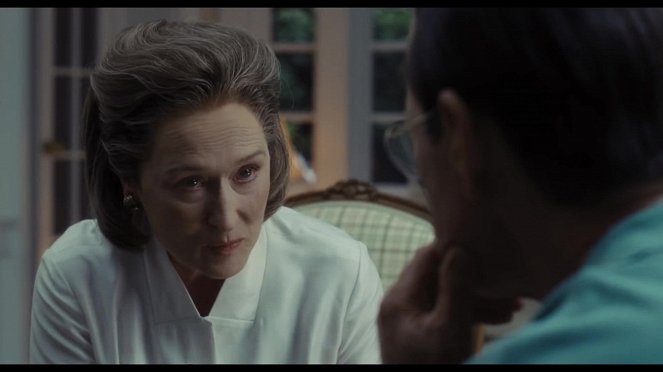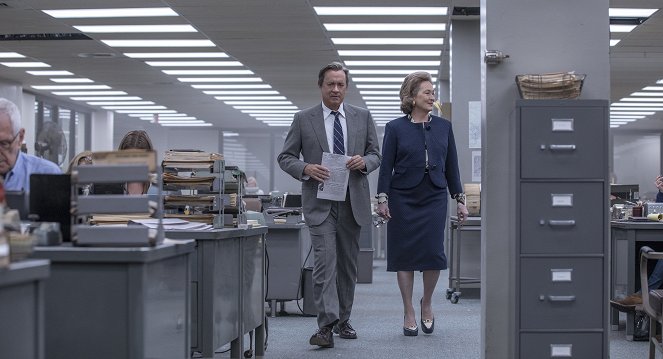Regie:
Steven SpielbergKamera:
Janusz KaminskiMusik:
John WilliamsBesetzung:
Meryl Streep, Tom Hanks, Sarah Paulson, Bob Odenkirk, Tracy Letts, Bradley Whitford, Bruce Greenwood, Matthew Rhys, Alison Brie, Carrie Coon (mehr)Streaming (4)
Inhalte(1)
1971 steht mit Katharine „Kay“ Graham (Meryl Streep) eine Frau an der Spitze des Verlags, der die renommierte „Washington Post“ herausbringt. Als erste weibliche Zeitungsverlegerin der USA hat Kay ohnehin keinen leichten Stand, außerdem steht die Zeitung kurz vor dem Börsengang - brisant wird es, als Chefredakteur Ben Bradlee (Tom Hanks) über einen gigantischen Vertuschungsskandal im Weißen Haus berichten will, in den allein vier US-Präsidenten verwickelt sind. In einem nervenzerreißenden Kampf für die Pressefreiheit riskieren Kay und Ben ihre Karrieren und die Zukunft der Zeitung - ihr mächtigster Gegner ist dabei die US-Regierung… (Universal Pictures Germany)
(mehr)Videos (27)
Kritiken (13)
Ein rein amerikanisches Thema. Ein Vorspiel zur Watergate-Affäre, der Blick hinter die Kulissen wichtiger Printmedien wie der Washington Post und der New York Times und natürlich die Geschichte von Kate Graham. Das konnte niemand anderes spielen als Meryl Streep und Tom Hanks. Wenn Sie Aufnahmen von Druckmaschinen mögen, geben Sie einen Stern mehr.
()
Zu sehr, sogar viel zu sehr amerikanisch. Ich habe gehofft, er würde auf seinen peinlichen Applaus und das Jubeln verzichten, doch leider... Ein durchschnittlicher Film mit der Garantie guter schauspielerischer Leistungen eines bewährten Trios (Steep, Hanks, Letts). Trotz der beträchtlichen Länge habe ich mich nicht gelangweilt, Spielberg ist es gelungen, die Spannung im Zuschauer aufrechtzuerhalten, wie es weitergeht.
()
Ein perfekter Film mit dem großartigen Tom Hanks in der Rolle eines Hai-Terminator-Journalisten, der absolut glaubhaften Meryl Streep in der Rolle einer unschlüssigen, ein bisschen schüchternen aber gleichzeitig selbstbewussten Verlegerin, einer ausgezeichneten Besetzung aller Nebenrollen und mit Spielbergs präziser Regie. Von der Musik von John Williams ist nicht besonders viel da. Aber wenn sie erklingt, leistet sie eine tolle Arbeit. Kamińskis Kamera zaubert eine Stimmung hervor, die so überzeugend wie in Bridge Of Spies - Der Unterhändler oder Lincoln ist. Bei der Handlung habe ich mich in die investigative Kriegsberatung der Journalisten in Bradlees Haus verliebt, wo riesige Probleme geklärt werden, Toasts ausgeteilt werden und wo man Zitronenlimonade trinkt. Wer eine Fortsetzung möchte, zu der das Ende des Films eindeutig auffordert, sollte sich Die Unbestechlichen ansehen – ich bin mir sicher, dass sich das Steven Spielberg genau so vorstellt.
()
I expected The Post to be a good movie. I did not expect it to be nearly flawless. There is much to be admired in it, especially knowing that the project was announced in March 2017 and was in cinemas by December, but what I enjoyed the most was how various subworlds (family and work, men and women, friends and colleagues, The Washington Post and The New York Times) constantly collide in the film at the level of both narrative and style, which adds dynamics and layering to a film that is largely based on a few people in a room discussing huge amounts of data or deciding on something essential. ___ The differences between the worlds among which the characters move are made clear thanks especially to Kamiński’s camerawork and the directorial control of the space in front of the camera. There is almost no shot that does not convey something through its composition, the placement of the actors, the inevitability with which the characters dominate the given setting (Kay is more comfortable at home, Ben in the newsroom), the contrast of events in the foreground and background, the speed and direction of camera movements.... At the same time, the film never comes across as didactic, but rather as something entirely natural and organic. For example, granddaughters running in the garden in the background during a work conversation between Ben and Kay, and the camera’s sharp glance at a portrait of the female protagonist’s father hanging on a column that she walks past gives the scenes extraordinary emotional depth without descending into sentimentality and slowing down the narrative. ___ Even though we are subjected to a constant flow of information, especially in the first half, which covers several days (in the second half, the field of possibilities of how the narrative can develop further is significantly narrowed and mostly takes place in a single day, thus making it even more suspenseful), you can still find your bearings in the film and know where it is headed thanks to the clarity with which it was made. ___ Thematically, The Post is a prequel to All the President’s Men on the one hand and, on the other hand, another Spielberg story about an absent father, a family (due mainly to which a night-time conversation with the daughter is important, though for many that will be irritating proof that Spielberg can’t handle endings) and the occasional necessity of bending certain rules in order to keep democracy alive. For only the third time in a Spielberg film (after The Color Purple and The BFG), there is at the centre of events a female protagonist around which all storylines and motifs – the fight with the government, social expectations, self-confidence – converge (initially intersecting roughly halfway through the film, until which time Kay does not become involved in the newspaper’s contents). ___ The Post is thus relevant not only as a critique of unlimited power and defence of freedom of the press, but also as a story about a woman who has to risk everything in order to show men that she is just as capable as they are and to thus achieve, at the individual level, the same freedom desired by newspapers to write without sanction about dubious government activities (the strongest scenes include those in which Meryl Streep finds herself surrounded by men who literally and figuratively prevent her from moving and to whom she first submits before gradually learning to stand up to them).___ Due to its seeming lack of action, Spielberg’s latest work will not be easy to follow particularly for non-American viewers (especially those who don’t pay attention to what the film conveys visually), but if you liked Lincoln, you should be very pleased with The Post, despite its being even less of a spectacle (the most epic scene depicts the printing and distribution of newspapers). 90%
()
(weniger)
(mehr)
Spielberg is really at home with these political issues. Maybe even too much. More than would be necessary. When I put on The Post, the initial shots of Vietnam were flawless. I even realized that I could easily imagine a film set in Vietnam and I wouldn’t mind it being repetitive at all. But after a while, the story goes where it needs to and so the story of the journalists sets off and that completely numbed me. As if they wanted to turn every turd into a movie in the US.
()



Werbung